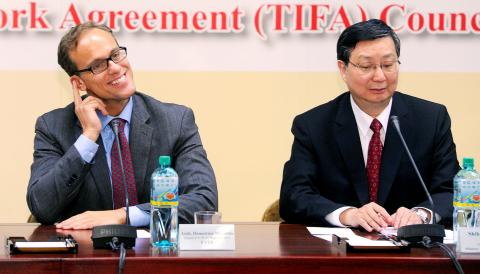Taiwan and the US yesterday reached consensus on trade principles for the information and communication technology (ICT) service sector as well as international investments in the seventh Taiwan-US Trade and Investment Framework Agreement (TIFA) meeting.
Vice Minister of Economic Affairs Bill Cho (卓士昭) and Deputy US Trade Representative Demetrios Marantis told a press conference that the two sides agreed to cooperate to enhance domestic regulatory capacity and support the expansion of ICT networks and services.
Under the joint statement on trade principles for the ICT service sector, Taiwan and the US agreed to share information and experience with each other on legislation, regulations and programs in areas relevant to promoting the ICT service sector.

Photo: Wang Min-wei, Taipei Times
A consensus was also reached on “political commitments” to ensure sustained bilateral trade and investment, with the two governments agreeing to create an open and non-discriminatory investment climate, and supporting a fair market in which state-run enterprises will not enjoy preferential treatment.
Cho said the principles for international investments are expected to enhance bilateral trade ties, create jobs, enhance economic growth and intensify promotion of a “Taiwan-US Investment Agreement.”
Marantis said the US recognized Taiwan has a strong interest in signing a free-trade agreement (FTA) with the US and joining the Trans-Pacific Partnership (TPP), a proposed free-trade agreement aimed at liberalizing economies in the Asia-Pacific region and fostering international trade.
Taiwan cannot be “invited” unilaterally by the US to join the TPP, but must prove it can meet obligations affecting the interests of 12 current member economies including the US, he said.
Marantis also said the US had raised the issue of importing more US meat products to Taiwan, but did not win support from Taiwan’s representatives, because of the Taiwanese government and its citizens’ concerns that US meat products may contain residues of the livestock feed additive ractopamine.
“We understand this is a longstanding concern of Taiwanese, but we will continue promoting the trade of US meat products and proving the quality of our product is consistent with international standards,” he said.
The US representative avoided specifying that he was referring to pork, and talked about “meat products” throughout. Cho did not comment on the issue.
The two sides have agreed to schedule the eighth round of TIFA talks next year in Washington, Marantis said, adding that the US expects future talks to be an annual event.
The Ministry of Economic Affairs will establish two sections for talks under TIFA to negotiate with the US about solutions to technical barriers to trade and bilateral investment, Cho said.
He added that the government would seek further assistance from the US on access to the TPP and would liberalize laws and regulations to try to meet its requirements.

The CIA has a message for Chinese government officials worried about their place in Chinese President Xi Jinping’s (習近平) government: Come work with us. The agency released two Mandarin-language videos on social media on Thursday inviting disgruntled officials to contact the CIA. The recruitment videos posted on YouTube and X racked up more than 5 million views combined in their first day. The outreach comes as CIA Director John Ratcliffe has vowed to boost the agency’s use of intelligence from human sources and its focus on China, which has recently targeted US officials with its own espionage operations. The videos are “aimed at

STEADFAST FRIEND: The bills encourage increased Taiwan-US engagement and address China’s distortion of UN Resolution 2758 to isolate Taiwan internationally The Presidential Office yesterday thanked the US House of Representatives for unanimously passing two Taiwan-related bills highlighting its solid support for Taiwan’s democracy and global participation, and for deepening bilateral relations. One of the bills, the Taiwan Assurance Implementation Act, requires the US Department of State to periodically review its guidelines for engagement with Taiwan, and report to the US Congress on the guidelines and plans to lift self-imposed limitations on US-Taiwan engagement. The other bill is the Taiwan International Solidarity Act, which clarifies that UN Resolution 2758 does not address the issue of the representation of Taiwan or its people in

US Indo-Pacific Commander Admiral Samuel Paparo on Friday expressed concern over the rate at which China is diversifying its military exercises, the Financial Times (FT) reported on Saturday. “The rates of change on the depth and breadth of their exercises is the one non-linear effect that I’ve seen in the last year that wakes me up at night or keeps me up at night,” Paparo was quoted by FT as saying while attending the annual Sedona Forum at the McCain Institute in Arizona. Paparo also expressed concern over the speed with which China was expanding its military. While the US

SHIFT: Taiwan’s better-than-expected first-quarter GDP and signs of weakness in the US have driven global capital back to emerging markets, the central bank head said The central bank yesterday blamed market speculation for the steep rise in the local currency, and urged exporters and financial institutions to stay calm and stop panic sell-offs to avoid hurting their own profitability. The nation’s top monetary policymaker said that it would step in, if necessary, to maintain order and stability in the foreign exchange market. The remarks came as the NT dollar yesterday closed up NT$0.919 to NT$30.145 against the US dollar in Taipei trading, after rising as high as NT$29.59 in intraday trading. The local currency has surged 5.85 percent against the greenback over the past two sessions, central